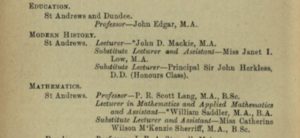Janet Low (d.1962)
As far as we know, the first woman to teach History formally within the University was Janet Low. She was one of several people, men and women, appointed during the First World War as ‘Temporary Lecturers and Assistants… Acting in place of Members of Staff absent in Military of other National Service’. She served in this role for the academic years 1917-19.
Janet Isabella Low was the daughter of William Low, owner of the Dundee-based grocery chain. Around 1900, her father bought the estate of Blebo, near Cupar. We currently known little about Janet’s early life, until she graduated from St Andrews in 1907, with an MA Honours in Classics.

In 1917, the University was struggling to provide teaching due to staff absent on military service. Among them was the lecturer in ‘Modern History’, John D. Mackie, who was serving in the Argyll and Sutherland Highlanders. Mackie’s absence was partly covered by the Principal of the University, John Herkless (who was also Professor of Ecclesiastical History in St Mary’s College). Herkless taught the Honours class, and Janet Low was appointed as temporary lecturer to cover the ‘general’ and ‘special’ classes (that is, the first and second year students). The Minutes of University Court record that she was to receive a salary of £21 a term.
The following year, with Mackie still absent (and wounded), Low and Herkless continued to cover his teaching. This time, the minutes state that ‘the remuneration of £150 [should be] divided equally betwixt them’.
Some ‘assistants’ (male and female) were appointed and re-appointed repeatedly, sometimes for decades, but in Low’s case, the position disappeared when Mackie returned.
In 1919, Low made a gift to the University of £200, to institute the Janet I. Low Prize in Modern History.
Janet Low lived at Blebo until 1951, when she decided to sell the estate, and move to a house on South Street, St Andrews. Over the years, she was actively involved in local affairs: she served as Justice of the Peace, and was awarded an OBE ‘for political and public services in Fife’ in the Coronation Honours of June 1953. She was also involved in the St Andrews Preservation Trust, and left money to the Trust in her will. She had funded the construction of Kemback Hall for the local community in 1938 (see St Andrews in Focus, July/August 2019,p.16). The collection of photographic lantern slides she donated to the University of St Andrews suggests an interest in beekeeping, and travels to Italy, Greece and Belgium, as well as around Britain. She was a member of the Society for the Promotion of Hellenic Studies and of the Society for the Promotion of RomanStudies.
Janet Low died in 1962. The Janet Low Prize in Modern History is still awarded every year.
Written by Aileen Fyfe; with input from Beth Sykes, who was part of the STEP2021 project, and was then going into her fourth year studying French and Modern History at the University of St Andrews

So pleased to see this write up of Janet Low. When I won the eponymous prize in Single Honours Modern History in 1971, no one could tell me anything about her. It was many years later that I stumbled across the St Andrews women historians pages and found some illumination. Keep up the good work.